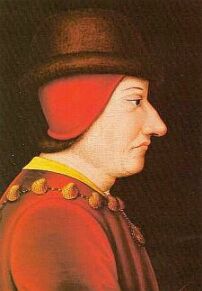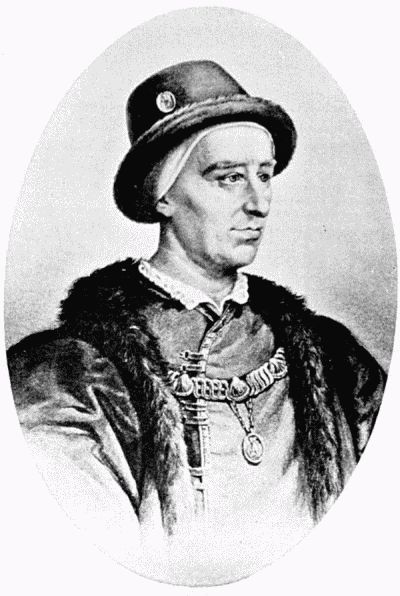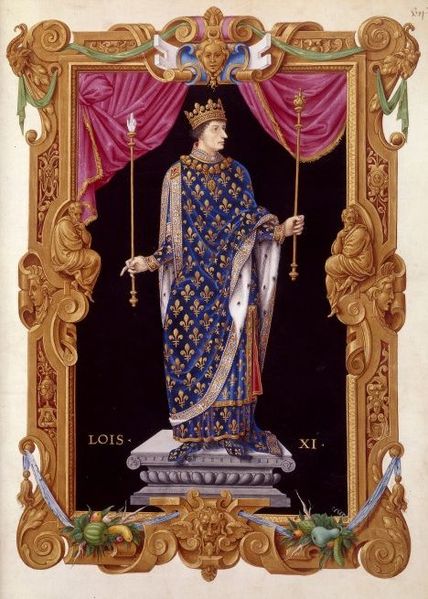<Back to Index>
- Explorer Samuel de Champlain, 1580
- Architect Robert Adam, 1728
- King of France Louis XI, 1423
PAGE SPONSOR



Louis XI (3 July 1423 – 30 August 1483), called the Prudent (French: le Prudent) and the Universal Spider (Middle French: l'universelle araignée) or the Spider King, was the King of France from 1461 to 1483. He was the son of Charles VII of France and Mary of Anjou, a member of the House of Valois, grandson of Charles VI and Isabeau of Bavaria and
one of the most successful kings of France in terms of uniting the
country. His 22-year reign was marked by political machinations,
spinning a spider's web of plot and conspiracy which earned him his
nickname. His scheming and love for intrigue earned him many enemies, in particular the following: Charles VII, his own father, Charles de Valois, Duc de Berry, his brother, and Charles the Bold, Duke of Burgundy. Louis
is known to have been shrewd and often vicious. In curbing the power of
the dukes, he vastly expanded the power of the monarchy. He was born at Bourges, Cher, in
1423, when the English held northern France and his father Charles VII
was restricted to the centre and south. Louis was the grandson of the
strong-willed Yolande of Aragon,
the princess who was the driving force in saving France from the
English. Louis despised his father, regarding him as a weakling. On 24 June 1436 he met his father’s diplomatic choice for daughter-in-law, Margaret of Scotland, daughter of James I, King of Scots. His marriage was forced upon him which did not help their relationship.
However, royal marriages in the 15th century were always political. There
are no direct accounts from Louis or his young bride of their first
impressions of each other, and it is mere speculation to say whether or
not they actually had negative feelings for each other. Several
historians think that Louis had a predetermined attitude to hate his
wife. But it is universally agreed upon that Louis entered the ceremony
and the marriage itself dutifully, as evidenced by his formal embrace
of Margaret upon their first meeting. Louis's
marriage shows both the nature of medieval royal diplomacy and the
precarious position of the French monarchy. The marriage took place 25
June 1436 in the afternoon in the chapel of the castle of Tours and was
presided over the Archbishop of Reims. By the standards of the time, it
was a very plain wedding. Louis,
13, looked clearly more mature than his bride, 11. Margaret looked like
a beautiful “doll,” interesting because she was treated as such by her
in-laws. Charles wore “grey riding pants” and “did not even bother to remove his spurs.” The
Scottish guests were quickly hustled out after the wedding reception.
This was seen as something of a scandal by the Scots. King Charles’
attire and the speed with which the guests were hustled out was
considered an insult to their small but proud country. However, this
spoke to the impoverished nature of the French court at this time. They
simply could not afford an extravagant ceremony or to host their
Scottish guest for any longer than they did. Following
the ceremony, “doctors advised against consummation” because of the
relative immaturity of the bride and bridegroom. Margaret continued her
studies and Louis went on tour with Charles to loyal areas of the
kingdom. Even at this time, Charles was taken aback by the intelligence
and temper of his son. During this tour, Louis was named Dauphin by Charles, as is traditional for the eldest son of the king. In 1440 Louis was part of the uprising known as the Praguerie, which sought to control Charles and install Louis as Regent.
The uprising failed and Louis was forced to submit to the King, who
forgave him. The title, Praguerie, comes from similar uprisings that
took place in Prague. Louis,
17, was greatly influenced by Charles de Bourbon to foolishly revolt
against Charles VII. Bourbon's troops were “badly out of condition”
with “poor logistics.” Louis was forced to retreat to Paris but was “by
no means trounced.” In
fact, before his final defeat, “[Louis's]... military strength, combined
with antipathy of the masses for great lords, won him the support of
the citizens of Paris.” This was a great learning experience for Louis. James Cleugh notes: “Like
other strong minded boys, he had found at last he could not carry all
before him by mere bluster. Neither as prince nor as king did he ever
forget his lesson. He never acted on pure impulse, without reflection,
though to his life’s end he was constantly tempted to take such a risk.” Louis continued soldiering. In 1444 he led an army of "ecorcheurs" against the Swiss at the Battle of St. Jakob an der Birs and
was impressed by the latter's military might. He still loathed Charles,
however, and on 27 September 1446 he was ordered out of court and sent to his own province of Dauphiné,
where he was to establish order. Despite frequent summons by the King,
the two would never meet again. In Dauphiné, Louis ruled as King
in all but name, continuing his intrigues against his father. On 14
February 1451, Louis, 27, who had been widowed for six years, made a
strategic marriage to the eight year old Charlotte of Savoy, without Charles' consent. Finally, in August 1456, Charles sent an army to Dauphiné. Louis fled to Burgundy where he was granted refuge by Duke Philip the Good and his son Charles the Bold and settled in the castle of Genappe.
King Charles was furious when Philip refused to hand over Louis; he
knew the man and warned that the Duke was "giving shelter to a fox who
will eat his chickens".
In 1461 Louis learned that his father was dying. He thus hurried to Reims to be crowned in case his brother, Charles, Duke of Berry, beat him to it. Ironically,
after being such a thorn in his father's side, Louis pursued many of
the same interests as his father had pursued less successfully:
limiting the powers of the Dukes and Barons of France. He justified
this as sheer Realpolitik:
it was now in his best interests, since he was now the king. He
suppressed many of his former co-conspirators, who had thought him
their friend. He became extremely fiscally prudent, whereas he had
previously been lavish and extravagant. He wore rough and simple
clothes and mixed with ordinary people and merchants. A candid account of some of Louis's activities is given by the courtier, Philippe de Commines, in his memoirs of the period. Philip the Good was keen to start a Crusade and Louis gave him money in exchange for a number of territories including Picardie and Amiens. But Philip's son, Charles, was angry, feeling that he was being deprived of his inheritance. He joined a rebellion called the League of the Public Weal,
led by Louis's brother Charles. Although the rebels were largely
unsuccessful in battle, Louis was forced to grant an unfavourable peace
as a matter of political expediency. Upon
becoming Duke in 1467, Charles seriously considered having an
independent Kingdom of his own, but he had many problems with his
territories, especially with the people of Liège who were constantly rising against him. Louis was their ally. In 1468 Louis and Charles met in Peronne but
in the course of the negotiations they learned that the Liegois had
again risen up and killed the Burgundian governor. Charles was furious. Philippe de Commines and
the Duke's other advisors had to calm him down for fear that he might
hit the King. Louis was forced into a humiliating treaty, giving up
many of the lands he had acquired and witnessing the siege of Liege in
which hundreds were massacred. But
once out of Charles's reach, Louis declared the treaty invalid and set
about building up his forces. His aim was to destroy Burgundy once and
for all and end a feud which had lasted over three generations since
the murder of Louis, Duke of Orléans in 1407. War broke out in 1472, but Charles's siege of Beauvais and other towns were unsuccessful and he finally sued for peace. Commines rallied to the King's side and was made welcome. Meanwhile England was going through its own civil conflict known as the Wars of the Roses. Louis had an interest in this war since Charles the Bold was allied with the Yorkists who opposed King Henry VI. When the Earl of Warwick fell out with Edward IV,
whom he had helped to the throne, Louis granted him refuge in France.
He then encouraged Warwick to form an alliance with his bitter enemy Margaret of Anjou in
order to restore her husband Henry VI to the throne. The plan worked
and Edward was forced into exile, but he later returned and Warwick the
Kingmaker was killed at the Battle of Barnet in 1471. King Henry was murdered soon afterwards. Now the undisputed master of England, Edward invaded France in 1475, but Louis was able to negotiate the Treaty of Picquigny by
which the English army left France in return for a large sum of money.
The English renounced their claim to French lands such as Normandy and the Hundred Years War could
be said to be finally over. Louis bragged that although his father had
driven the English out by force of arms, he'd driven them out by force
of pâté, venison and good wine. Louis
still had to take care of the Duke of Burgundy and for this he employed
the Swiss, whose military might was renowned and which he had admired at Birs. War broke out between Charles and the Swiss, but it was a disastrous campaign for the Duke and he was finally killed at the Battle of Nancy on 5 January 1477, ending the Burgundian Wars. Louis had destroyed his sworn enemy. Other lords who still favoured the feudal system gave in to his authority. Others like Jacques d'Armagnac, Duke of Nemours were executed. Louis
then started developing the Kingdom. He encouraged trade fairs and the
building and maintenance of roads. He is seen as one of the first
modern Kings of France, taking it out of the Middle Ages. Louis XI was very superstitious. He surrounded himself with astrologers. Interested in science, he once pardoned a man sentenced to death on condition that he serve as a guinea pig in a gallstone operation. By war, by cunning and with sheer guile, Louis XI overcame France's feudal lords, and at the time of his death in the Château de Plessis-lez-Tours, he had united France and laid the foundations of a strong monarchy. He
was however a secretive, isolated and reclusive man and few mourned his
passing. Despite his cunning and overall policy of Realpolitik, Niccolò Machiavelli actually criticized Louis harshly in The Prince, calling him shortsighted for degrading France's ability and prestige by abolishing his own infantry in favor of Swiss mercenaries. Louis XI died in August of 1483 and was interred in the Notre-Dame de Cléry Basilica in Cléry-Saint-André in the Arrondissement of Orléans. His wife Charlotte died a few months later and is interred with him. Louis XI was succeeded by his son, Charles VIII, who was thirteen, and his eldest daughter Anne of France became Regent.